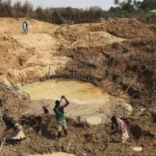South Africa's ambassador to France found dead at foot of Paris hotel tower
Fitch Downgrades South Africa; S&P Cuts Outlook

ENCA
Fitch Ratings on Friday cut South Africa’s debt to one notch above “junk” status, an indictment of the government’s persistent fumbling of policies that could help to boost growth and woo foreign investors.
“Growth performance and estimates of growth potential have weakened further,” Fitch said, cutting South Africa’s foreign debt rating to BBB-, one step from the sub-investment category that would deter many institutional fund managers. Standard & Poor’s Ratings Services, meanwhile, lowered its outlook on South Africa’s debt to negative from stable.
“The country faces domestic constraints including an inadequate electricity supply and overall weak business confidence inhibiting substantial private sector investment,” S&P said. Moody’s Investors Service is now alone in rating South Africa’s debt one notch higher than its competitors, at Baa2 on its scale.
With two of the three top rating firms just a step away from a “junk” gradient that would greatly increase the interest South Africa must pay to borrow abroad, some economists said they see little evidence that the government is ready to turn things around. “We are now more negative than ever on the ability of the government to undertake growth-boosting reforms,” said Peter Attard Montalto, senior emerging-markets economist at Nomura in London.
“We are more convinced than ever that South Africa needs a substantial and very painful shock to change”. Several such shocks in recent years haven’t goaded the government into action. Strikes have dogged mines and factories since 2012, when police shot and killed three dozen miners on strike outside Johannesburg, a dilapidated power grid prompted regular blackouts for months earlier this year. Now a record drought threatens agricultural output and water supplies.
President Jacob Zuma has also shown a knack for frustrating foreign partners including the U.S. Last month President Barack Obama said South African agricultural products would be dropped from a preferential trade deal for African countries—known as the African Growth and Opportunity Act, or AGOA—unless South Africa dropped long-standing opposition to U.S. chicken imports by early next year.
Last year South Africa sold $1.7 billion worth of duty-free automobiles, wine and other goods to the U.S. thanks to AGOA. If the two countries don’t reach a deal on chicken imports soon some of those exports could be the latest casualty of South Africa’s slowing economy.
“South Africa has had more than adequate warning,” said Sean Coit, an aid to Sen. Chris Coons (D., Del.), who led negotiations about the renewal of the AGOA legislation in the U.S. “Those warnings have simply not been adequately addressed.”
South Africa is already set to grow an anemic 1.4% this year and even less next year, according to the International Monetary Fund. The government has said a third of the workforce can’t find a job, and frustration over mounting inequality is widespread.
“The politics of South Africa depend upon the economy growing and generating some jobs. It can’t afford to have major sectors messed up,” said Paul Collier, director of the Centre for the Study of African Economies at Oxford University.












Leave a Reply
Be the First to Comment!
You must be logged in to post a comment.
You must be logged in to post a comment.